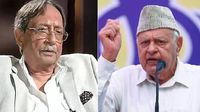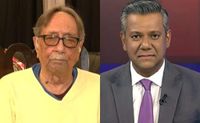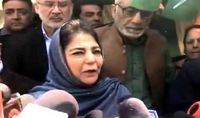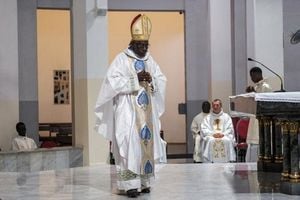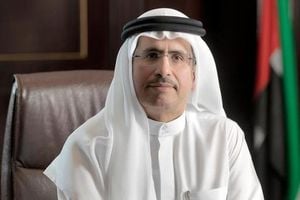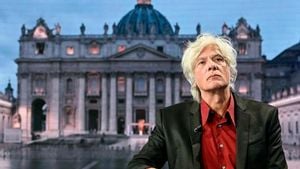In a revelation that has ignited political controversy in Jammu and Kashmir, former chief of the Research and Analysis Wing (RAW), AS Dulat, has claimed that ex-Chief Minister Farooq Abdullah privately supported the abrogation of Article 370, which stripped the region of its special status. This assertion is part of Dulat's upcoming memoir, The Chief Minister and the Spy, set to be released on April 18, 2025.
Dulat, who has been a prominent figure in Indian intelligence, disclosed that during discussions with Abdullah, the former Chief Minister indicated he could have facilitated the passage of the proposal to abrogate Article 370 in the Jammu and Kashmir Assembly, had he been consulted by the Centre. Dulat stated that this conversation took place while Abdullah was under house arrest following the controversial move by the BJP-led government on August 5, 2019.
"I asked Dr. Sahab (Farooq Abdullah) and Omar Abdullah, but they said they knew nothing... Dr. Sahab said to me, 'even if they (Centre) wanted to do this (abrogate Article 370), they should have taken me into confidence. Why did they house arrest us? We could have passed it in the Assembly if needed,'" Dulat recounted in an interview with ANI.
This statement comes against the backdrop of Jammu and Kashmir being under President's rule from June 2017 until 2024, which raises questions about the feasibility of passing such a resolution in the Assembly, as it was dissolved in 2018. Dulat's comments have prompted a strong reaction from Abdullah, who labeled the remarks a "cheap stunt" aimed at boosting book sales.
In an interview with PTI, Abdullah dismissed Dulat's claims as a fabrication, stating, "A benchmark of common sense should have been adopted by the author while penning the so-called memoir. He should have remembered that there was no assembly in 2018 as it had been dissolved." Abdullah further emphasized that even if the Assembly had been in session, he would never have supported such a resolution.
The fallout from Dulat's claims has been significant, with various political factions in Jammu and Kashmir expressing outrage. Abdullah's party, the National Conference, has faced criticism for allegedly softening its stance on the restoration of Article 370. The People's Democratic Party (PDP) and other smaller parties have also condemned the assertions made by Dulat.
"Dulat sahab, an ardent Abdullah supporter, has shared how Farooq sahab agreed with Delhi's illegal move of abrogating Article 370. There were already doubts about what transpired between the Abdullahs and PM days before J&K's special status was revoked. With this, it's clear that Farooq sahab chose to stay in Kashmir instead of the Parliament to help normalize gutting of J&K's constitution & subsequent betrayal," posted PDP's Iltija Mufti on social media.
In a bid to clarify his position, Dulat defended his book, stating, "This book is not a critique of Farooq Abdullah. This book is an appreciation of Farooq Abdullah." He insisted that much of the content is laudatory towards the former Chief Minister, suggesting that the controversial paragraph has been misinterpreted. Dulat explained that Abdullah was "very distraught, he felt betrayed and he was heartbroken" for not being consulted by the Centre, especially after their meeting with Prime Minister Narendra Modi just days before the abrogation.
In the book, Dulat writes, "Farooq was terribly hurt. Just as the BJP has never hidden its intention towards Kashmir and as far as Article 370 was concerned, so too had Farooq been extremely open about his willingness to work with Delhi. Maybe, he said, the National Conference could even have the proposal passed in the Assembly. We would have helped, he told me when I met him in 2020. Why were we not taken into confidence?" This narrative has fueled further debate on Abdullah's political maneuvers and his relationship with the central government.
As the release date of Dulat's memoir approaches, the political landscape in Jammu and Kashmir remains tense. The controversy surrounding these revelations continues to divide opinions, with some viewing it as an attempt to rewrite history while others see it as a candid reflection of the complex political dynamics in the region.
The abrogation of Article 370 has been a contentious issue since it was enacted, leading to widespread protests and a significant security clampdown in Kashmir. The implications of Dulat's claims, if true, could have far-reaching consequences for the National Conference and its leadership.
In the wake of these developments, the question remains whether Dulat's memoir will alter public perception of the Abdullah family and their role in the political landscape of Jammu and Kashmir. With the region's history of political intrigue and shifting allegiances, the coming weeks are likely to see intense scrutiny of both Dulat's assertions and Abdullah's denials.
As the debate unfolds, many are left wondering about the future of Jammu and Kashmir's political landscape and the potential for reconciliation or further division among its leaders.
